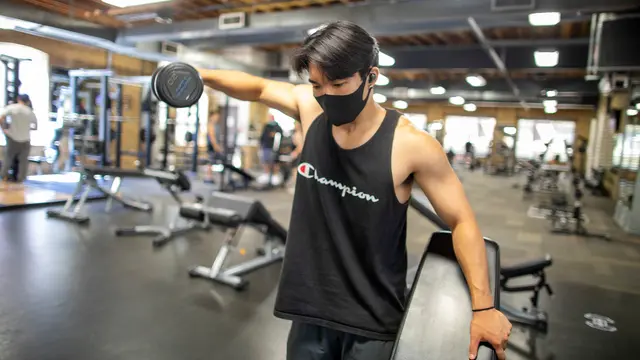04:13
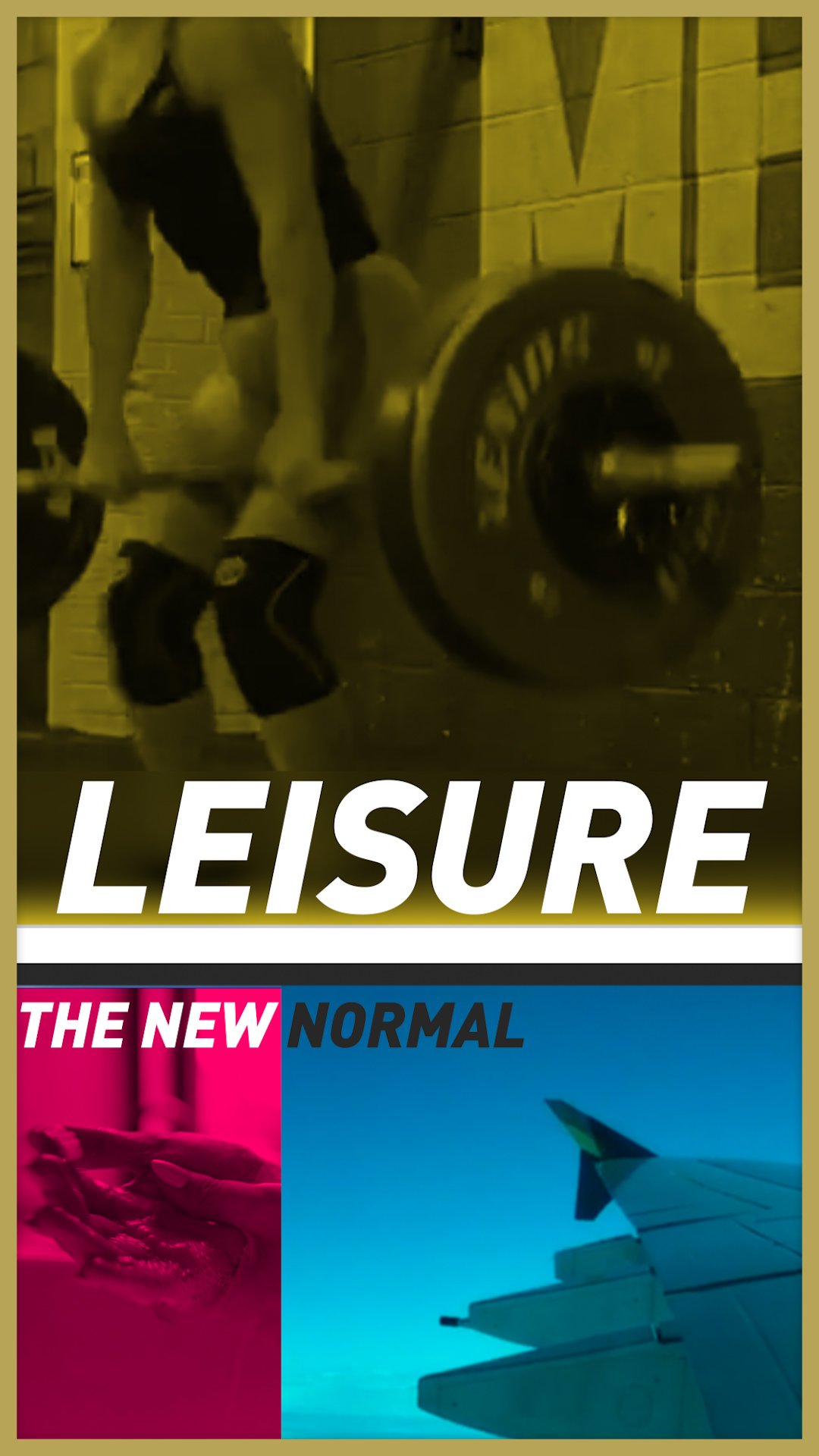
The leisure industry came to a standstill during the COVID-19 pandemic as gyms, swimming pools and other leisure facilities across Europe were forced to shut their doors to customers.
As lockdowns begin to ease across the continent, some leisurefacilitieshave now been able to reopen, but areoperating with strictCOVID-19 rules and regulations in place.
Here, CGTN Europe speaks exclusively to a gym owner, a weight lifter and a personal trainer about their challenges during the pandemic and discusses what the future holds for the struggling industry.
Alex Marks is the owner and manager of On Your Marks fitness in London, UK. He manages seven personal trainers in a private studio and after months of having to train from home, he's glad to be back. Alex thinks the period of upheaval could be turned into a positive future for the leisure industry, but has called on the government not to shut gyms again in the event of a second lockdown.
**Aitor Zabaleta-Korta **is a personal trainer in the Basque region of Spain. He explainshow his business dipped during lockdown as people could not afford to pay for his services. But he has seen a large rise in online customers via hisInstagram page as people recognize theydon't have to be in a gym to train.
**Olivia Thomson **is a weightlifter based in the UK, who has been trainingconsistentlyfor the past six years,specializinginCrossFit and Olympic bar weightlifting. She speaks about her struggles with not being able to go to the gym and how shehas overcome these by innovating witheveryday items at her family home.
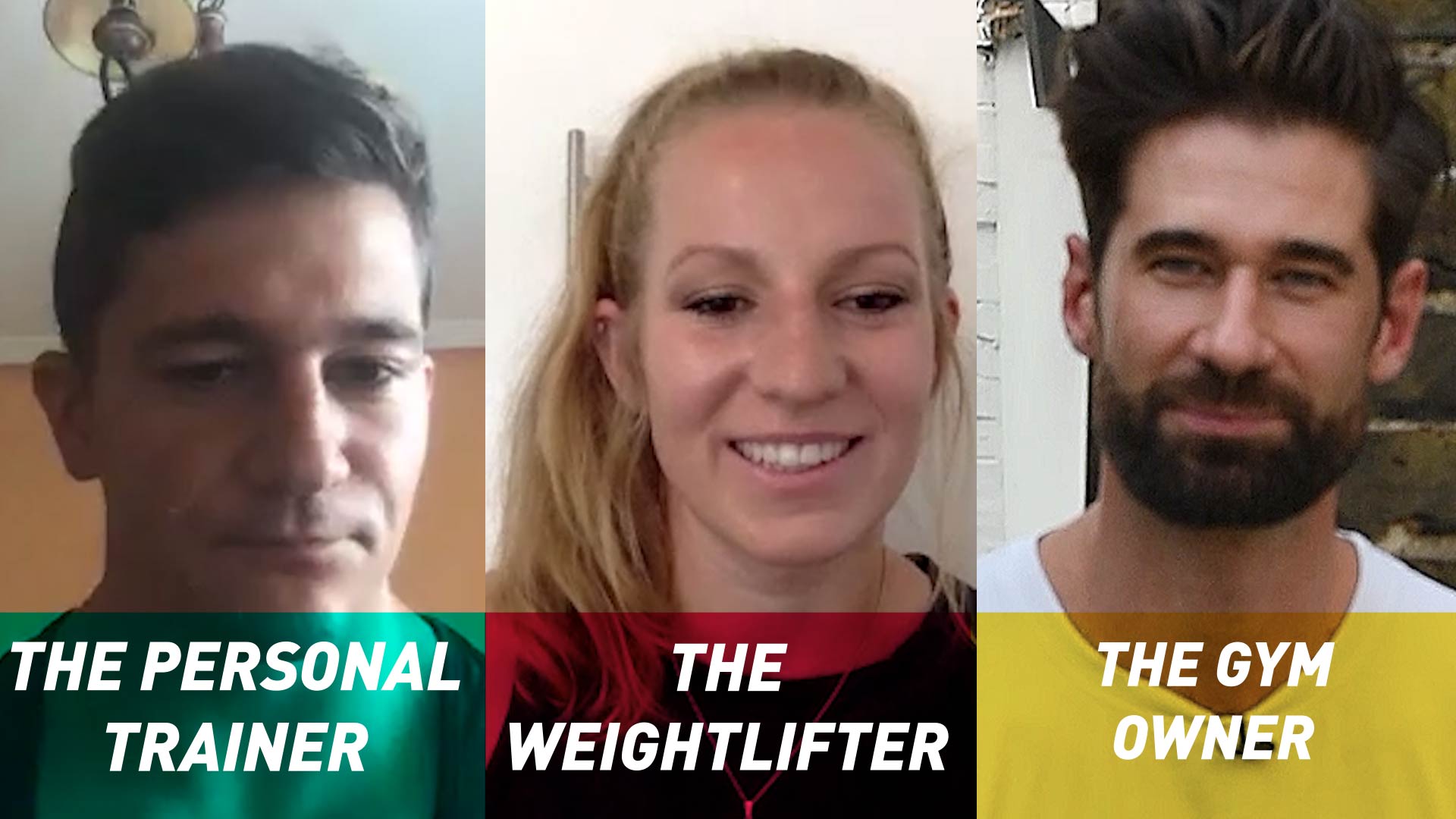
We spoke to three people (L-R) Aitor Zabaleta-Korta, Olivia Thomson and Alex Marks who were all directly affected by the pandemic. /CGTN
How has the COVID-19 lockdown impacted you and your business?
Olivia Thomson (the weightlifter): I think initially, probably like quite a few other people, it was very much like, I'm not going to be able to train for four months. I'm gonna lose all my muscle.But I think getting creative and just staying active, you don't realize how much you keep. Coming back to the gym I've realized I haven't actually lost anywhere near as much [muscle] as I thought I would have.
Aitor Zabaleta-Korta (the Personal trainer) : The two months that the lockdown was here in Spain, we lost a lot of customers, because they couldn't go to the gym, so they decided they were not training. That was really bad for me.
Alex Marks (the owner): Since lockdown, the fitness industry hasn't been without its difficulties. However, it's allowed us to pivot in a way that we've been able to actually grow a brilliant digital platform, where all personal trainers working freelance or for corporate gyms have been able to still work – hugely, positively, impacting the general health and wellness of our nation.
The two months that the lockdown was here in Spain, we lost a lot of customers because they couldn't go to the gym
- Aitor Zabaleta-Korta, personal trainer
How did youimprovise during the COVID-19 lockdown?
OT: When I went back to my parents' home in East Sussex, I used a roof box metal pole that belonged to my dad that was rectangular ... and I had two big buckets that I filled with coal on either end as a makeshift barbell.
AZK: We were forced to offer other products that we were not offering before. For example, lots of home workouts and books about how to train at home. Even some material to bring at home that those were the kind of annotations we made, because otherwise it will not be possible for us to go through the lockdown.
AM: We were able to grow ourdigital platform and it is hugely advantageous for our customers. People can exercise from their living rooms, kitchens, the little space that they may have in their homes.
What has been different since leisure facilities have reopened?
OT: So, I am personally part of a Pure Gym – there's lots of them around the UK – and they've introduced an app with a barcode to scan instead of having to use the keypad. So that's one thing they've introduced. Then there is hand gel as you enter and as you leave and then there are cleaning points everywhere.
AZK: I think it's obvious that everyone should wear a mask in the gym. In my opinion, people have been separated from one another, but I think that the things that we should do in the gym are different from the things we should be doing in a pub, for example.
AM: We've put really strict measures in place to ensure that all the trainers, the staff that are working here, are doing their very best to ensure social distancing where possible and have advised our clients upon entering a seven-step guideline to make sure that they feel comfortable and understand our own procedures. We've also got hand sanitizer readily available in every single corner of most of our training facilities.
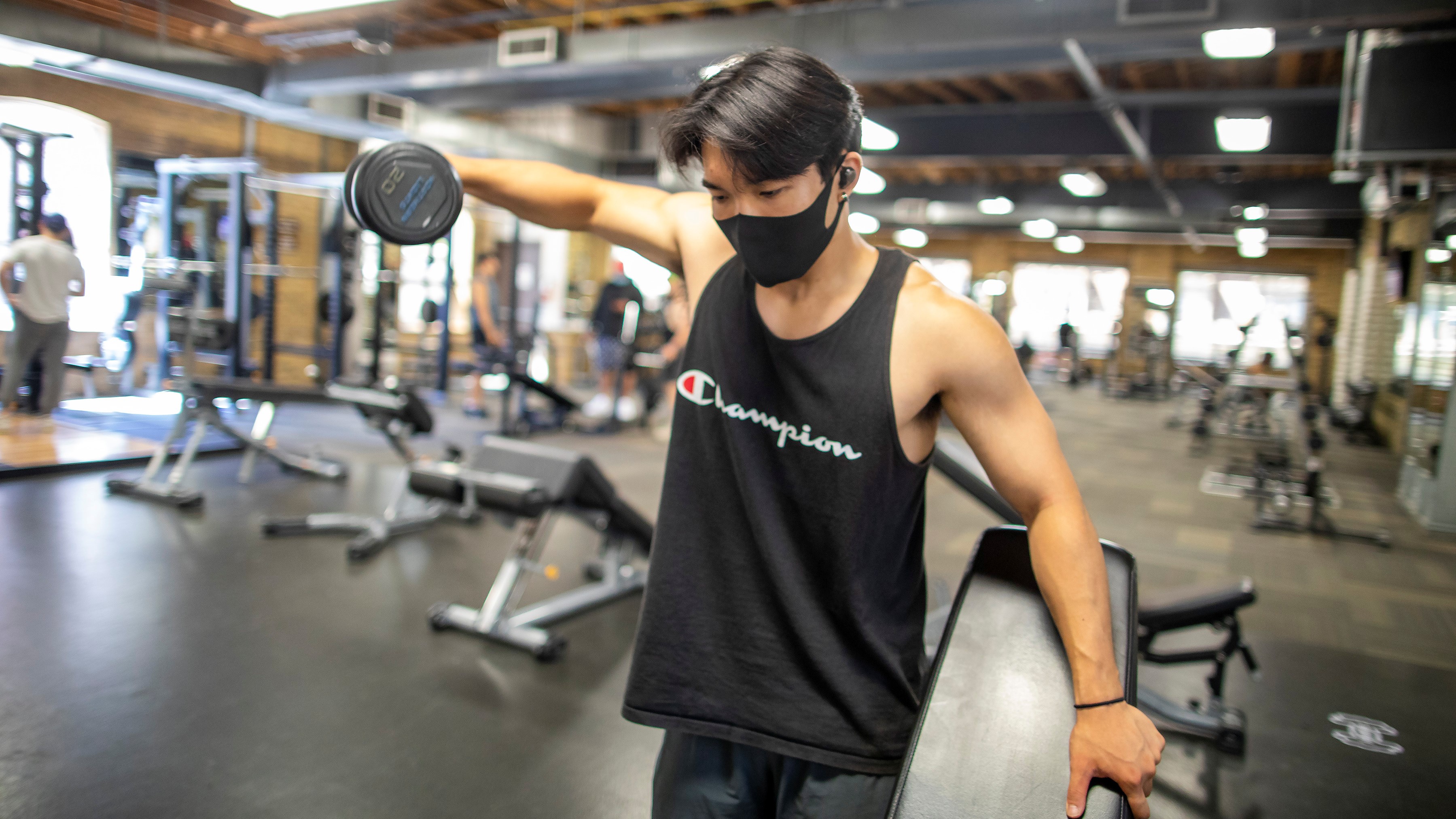
Many leisure facilities have now reopened across Europe, but they're not without their differences. /Reuters
What can governments do to help the leisure industry?
**OT: **I think maybe some incentives to get back to the gym. So obviously zero joining fees, or making sure that people are aware how much they are following the guidelines. There is social distancing, there is so much cleaning that has to go on.
AZK: I think they should make sure that the gyms have the minimal safety conditions to allow people to enter, because I think that COVID-19 is really dangerous but physical inactivity is the fourth-biggest reason why people die in the whole world.
**AM: **I would love for the government to take a much more proactive stance on the health and fitness industry and realize that actually we – fitness instructors, personal trainers, coaches – have been at the forefront of fighting diseases like obesity on a ground level.
Do you think morepeople will train remotely as a result of the pandemic?
OT: I definitely think the amount of people returning to gyms is less. And I have spoken to quite a few people who said they won't be renewing their membership just purely because they've realized, 'I don't need a gym to stay fit.'
AZK: I think people during the lockdown have discovered they can train from home and they can train in the park. And right now [that works], as many of them are afraid of going to the gyms because they think they can be infected.
**AM: **Working out from home is great, but we as coaches physically cannot help coach them to the position where we'd like to ensure they're getting the most out of exercise. We've seen thousands and thousands of potential injuries with poor exercise ... people not knowing how their body should be moving without quality coaching.
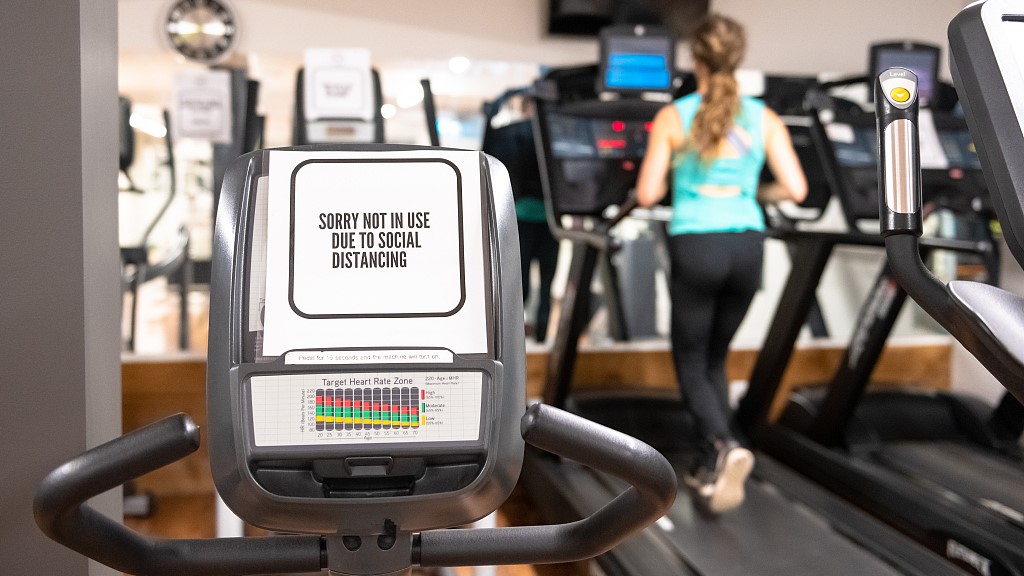
Most gyms have signs similar to the one above as they encourage gym-goers to maintain social distancing. /VCG
What do you say to people who are calling for leisure facilities to close if there is a local outbreak?
OT: I don't think I'd be overly worried. I think I'd just go back to what I was doing before. And just keep mixing it up to keep challenging myself.
**AZK: **Due to the alcohol consumption at pubs and clubs, for example, they are not making as good decision as they could on gyms. So I think that people should go the gym even if the local outbreaks appear.
AM: I think you're more likely to spread a virus under the influence of alcohol or in a close proximity.I feel like the gym is actually a really healthy environment for everybody to be in. Iwould go so far as to say, actually, if you're going to open any space, keep the gyms open and help us run them as cleanly and as effectively as possible.
Could anything positive come out of the leisure's 'new normal'?
OT: I think it's going to make people realize you can do varieties [of exercise], so even now, I'm still going to the park and doing a workout in the park. Whereas before I never would have done that. So I think it's made people a lot more open to what there is out there to do.
AZK: I think for our customers, yes. They have learnt that they can maintain some healthy habits at home and they don't have to a attend a gym in order to be in shape. So I think that's the positive lesson.
AM: There's a huge position of positivity coming out of COVID-19. I think people are becoming a little bit more self aware. They really see the value in health and wellness. You can see the positive numbers of people sort of looking through Instagram, the lens of the camera or other digital spaces.
Video editing: Pedro Duarte
 简体中文
简体中文

